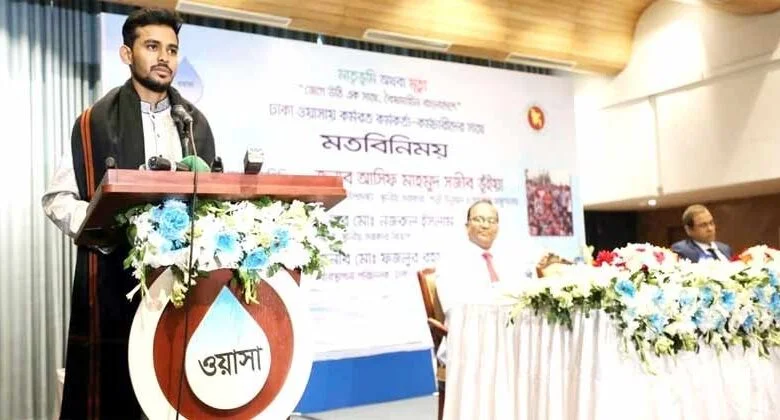Advisor to the Ministry of Local Government, Rural Development, and Cooperatives, Asif Mahmud Sajib Bhuiyan, has announced a firm resolve to make Dhaka WASA free from corruption. He said, “Previously, the name of WASA was synonymous with corruption. Contractors cannot engage in corruption without the involvement of officials. Therefore, WASA must become corruption-free. We want to accomplish this task while we are in office.”
He made this declaration on Wednesday during a discussion with Dhaka WASA officials at the WASA building in Kawran Bazar, where he addressed as the chief guest. The meeting was chaired by Dhaka WASA Managing Director Md. Fazlur Rahman, with Md. Nazrul Islam, Acting Secretary of the Local Government Division, as a special guest.
In his speech, Advisor Asif Mahmud addressed another widespread grievance about WASA: the lack of adequate water supply. He noted, “People in the city suffer to get water. The dry season is approaching, and water scarcity will become an even greater issue. Meeting the demand for water during this period will be a significant challenge for us.”
He urged WASA officials to prioritise supplying water based on public needs. He also requested employees to submit any demands or grievances in written form to the ministry. Also, he called for the discontinuation of the practice of displaying photographs of advisors and ministers on walls.
The Acting Secretary of the Local Government Division also shared his concerns, stating, “A project was initiated in 2015. In the last nine years, the project has only progressed by 5%. So much time has passed, yet no substantial work has been completed. Officials and employees have merely been drawing salaries and allowances. Why did this happen? This cannot continue. Corruption must be eradicated from WASA.” He encouraged all officials and employees to work transparently and with integrity.
During the meeting, Dhaka WASA Managing Director Md. Fazlur Rahman presented an overview of WASA’s activities. According to the presentation: WASA’s water supply network covers approximately 401 square kilometers in Dhaka; The transmission and distribution network spans around 4,918 kilometers; There are approximately 400,100 residential and commercial connections; The daily water demand is 2.6-2.65 billion liters; Five water treatment plants supply 900 million liters of water daily; A total of 1,061 pumping stations (comprising 1,203 tube wells) supply an additional 1.7 billion liters of water daily.
Source: Janakantha




